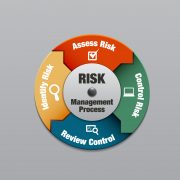An unrelenting desire for growth driven by human greed and unbridled consumerism has destroyed our planet in unimaginable ways. Decades of shareholder primacy have come at a cost of mass populism, far-reaching income inequality, human rights violations, and environmental catastrophes.
An ESG-mindset will help us re-establish the lost ecological and economic balance. Regulators, policymakers, and capital markets across the globe have taken note. The pandemic highlighted the need to reimagine and build resilient business models. The UN’s Sustainable Development Goals (SDGs) form the basis of leading ESG reporting frameworks and disclosures. We must sensitize ourselves to the enormity of the climate crisis. Ethical, transparent, and automated reporting will form the fountainhead of all change.
Risk, Reporting, And Disclosures
There has been growing support for ESG and Stakeholder capitalism. A whole new era of corporate reporting is emerging with a focus on 6 capitals: Financial, Environmental, Human, Physical, Relationship, and Innovation!
With sustainable development and the climate change movement gaining momentum, the sustainability reporting landscape is rapidly changing and becoming more demanding of companies to be more transparent with stakeholders.
Five forces: Planet, People, Customers, Governments, and Investors will operate on Innovation, changed mindsets, and a commitment to a better tomorrow. Unless all of us pull together we won’t achieve the exponential results that we are capable of delivering. The Shangri-la of Reporting will have Integrated thinking and a love for the Planet reflected fully!
Companies must adopt risk management tools that can help:
- Evaluate gaps between companies’ risk management initiatives and global best practices and implement enhancing actions
- Assess materiality and review priorities
- Effectively capture and measure data sets
- Commit to science-based commitments and targets
- Produce accurate and reliable outcomes and end reports
To standardize these disclosures reporting bodies and regulators have put together comprehensive reporting frameworks. Some of these include Global Reporting Initiative (GRI), Sustainability Accounting Standards Board (SASB), Integrated Reporting <IR>, Climate Disclosures Project (CDP), and Task Force on Climate-related Financial Disclosures (TCFD).
As for India, the transition to ESG reporting started in 2009 with the MCA issuing National Voluntary Guidelines on Corporate Social Responsibility, our first step towards mainstreaming ESG. Since then, ESG reporting in India has continuously evolved. A decade of several iterations has got us to the Business Responsibility and Sustainability Reporting (BRSR) today.
Drawing inspiration from GRI, the BRSR is a comprehensive extension of BRR. Continuous efforts by the SEBI and MCA have demonstrated their intent and commitment to ESG. Corporates must invest in accurate AI/ML-led data capture to enable reliable reporting. Dedicated efforts to embed ESG in the organisational purpose and culture will create long-term value.
Globally, the UK and US are recognizing climate risks and mandating climate reporting like never before. While the UK has gone with data-driven disclosures, the US has proposed that draw heavily from the “four pillars” disclosure framework of TCFD and Greenhouse Gas Protocols (GHG). TCFD is built on the following thematic pillars:
- Governance
- Strategy
- Risk Management
- Metrics and Targets
Corporations Must Act, The Time Is Now Or Never
While regulators are doing their bit, laws and guidelines mean nothing without honest and committed enforcement. Corporates must implement ESG through the virtuous cycle of measuring, mitigating, monitoring and transparently reporting. This will be enabled by engaging experts, exponential technology solutions and collaborative partnerships.
It is disheartening to see how two steps forward are followed by one step behind, the recent developments at Tesla and HSBC challenge the very foundations of ESG, sustainability and global warming.
Future CEOs and Board Members must understand that companies driven by societal purpose have delivered long-term value across key drivers such as sales, brand and reputation, capital access and market value, operational efficiency, talent retention and risk mitigation.
One such case is Unilever. Integrating sustainability in its organisational purpose, deep stakeholder engagement and prioritizing long-term value has delivered profitability, stable shareholder returns and deep penetration in competitive emerging markets.
“Conscious Capitalism” built on a greener planet, far-reaching and inclusive community development and transparent tech-enabled governance is the only way forward. I envision India leading the next decade of sustainability!
I recommend all readers of this article to read the books, Net Positive by Paul Polman and Outlast by Col. Rajeev Kumar and Mukund Rajan.
Blog author – Shailesh Haribhakti, Chairman Shailesh Haribhakti & Associates














